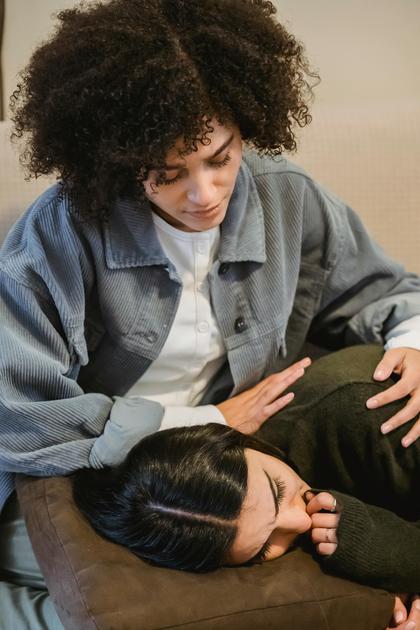As women over 30, we often find ourselves juggling countless responsibilities, and anxiety can silently creep in, affecting our daily lives. It’s a struggle that many of us share, whether it’s sleepless nights, overthinking every decision, or just feeling overwhelmed by the pressures of work and family. Navigating these feelings can seem daunting, but understanding the root causes of anxiety can empower us to take control and seek the peace we deserve. Together, we can explore practical solutions that resonate with our experiences and turn our anxieties into manageable parts of our lives. See how many women are finding relief without heavy medications while we uncover how to approach this challenge.
Join Thousands of Women Rediscovering Their Energy
This gentle method gave me back the vitality I thought was gone forever
Understanding Anxiety: The Silent Struggle for Women
Anxiety can feel like an unwelcome companion, quietly invading the lives of many women over 30. It is a silent struggle, often brushed aside as just stress or something they’ll “get over.” Yet, the truth is that anxiety can be debilitating, impacting daily life, relationships, and physical health. Many women feel isolated in their experiences, leading to feelings of inadequacy.
But you are not alone. Understanding what anxiety is, why it happens, and how it affects you is the first step in reclaiming your peace.
Common Triggers of Anxiety in Women Over 30
For women in this age group, common triggers include:
- Career Pressures: Balancing work and personal life can create significant stress.
- Family Responsibilities: Juggling children, elderly parents, and your own needs can be overwhelming.
- Health Concerns: Concerns over physical health, body image, and aging may ignite anxious feelings.
- Relationships: Navigating changes in friendships or romantic partnerships can add to emotional burden.
Each of these triggers can feed into a cycle of anxiety that feels impossible to break. Acknowledging these triggers can help you take proactive steps toward relief.
The Impact of Hormonal Changes on Women’s Mental Health
As women age, hormonal fluctuations can have profound effects on mental health. The transition into perimenopause or menopause can exacerbate feelings of anxiety. The drop in estrogen levels can lead to mood swings, sleep disturbances, and other physical symptoms.
If you’re feeling overwhelmed, you might wonder if you’re simply going through a phase or if there’s a more significant issue at play. Hormonal changes can make anxiety feel more acute, but recognizing these changes can help you manage your symptoms more effectively.
Stress Management Techniques That Really Work
Implementing stress management techniques can provide a necessary reprieve from the clutches of anxiety. Consider exploring:
- Exercise: Regular physical activity can boost your mood and reduce stress.
- Deep Breathing: Practicing deep breathing exercises can help calm your nervous system.
- Journaling: Writing down your thoughts can help clarify your feelings and release pent-up emotions.
In your journey, you may discover what uniquely resonates with you and brings solace amidst the chaos.
The Importance of Building a Support Network
No one should navigate anxiety alone. Building a support network of friends, family, or even support groups can provide a sense of community. Sharing your feelings can lighten the burden. Opening up may feel daunting but consider taking that brave step.
Connecting with others who understand can lead to meaningful support, laughter, and a sense of belonging, easing the isolation that often accompanies anxiety.
Mindfulness and Meditation for Anxiety Relief
Mindfulness and meditation practices allow you to ground yourself in the present moment. You might find that these practices serve as a gentle reminder to slow down amidst life’s demands. Consider starting with:
- Guided Meditations: Use apps or online resources for structured guidance.
- Mindful Breathing: Focusing on your breath can anchor you during anxious moments.
Taking just a few minutes each day to practice mindfulness can gradually shift your perspective, fostering a sense of calm and clarity.
When to Seek Professional Help for Anxiety
If anxiety begins to interfere with your daily life, seeking professional help can be a crucial step. Therapists and counselors can provide tools and strategies tailored to your unique experience. They can work with you to uncover the underlying issues contributing to your anxiety.
Recognizing when it’s time to seek help takes courage. Remember, prioritizing your mental health is a sign of strength!
Success Stories: Women Who Overcame Anxiety
Many women have faced anxiety and found ways to overcome it. Reading their stories can be incredibly inspiring:
- Sarah: After struggling to balance work and family, she began journaling and found freedom in expressing her emotions.
- Laura: Realizing her anxiety stemmed from career pressures led her to seek therapy, and she’s now confident in her decisions.
These women demonstrate that with the right tools, transformation is achievable. Your story doesn’t have to end in anxiety; other paths are available.
Lifestyle Changes to Reduce Anxiety Symptoms
Making lifestyle changes can significantly impact your anxiety levels. Simple modifications can lead to profound differences:
- Balanced Diet: Nutrition has a direct effect on mental health; prioritize whole foods.
- Sufficient Sleep: Prioritize sleep hygiene to ensure restorative rest.
- Limit Caffeine: High caffeine intake can exacerbate feelings of anxiety.
These changes won’t happen overnight, but each small step towards health can improve how you feel, giving you strength to face the day.
Empowering Yourself: Steps to Take Control of Your Mind
Empowerment comes from knowledge and action. If you feel ready to tackle your anxiety, start small. Develop a routine that includes:
- Daily Affirmations: Remind yourself of your strength.
- Set Realistic Goals: Break down your tasks into manageable segments.
- Engage in Hobbies: Make time for what makes you joyful.
Your journey is yours alone. Celebrate each step you take toward overcoming anxiety.
And if you’re wondering how women are finding relief without heavy medications, see here how many women are solving this without heavy drugs.
Remember, it is entirely possible to improve your symptoms and regain control over your life. Many women have done it, and so can you.
Join Thousands of Women Rediscovering Their Energy
This gentle method gave me back the vitality I thought was gone forever







